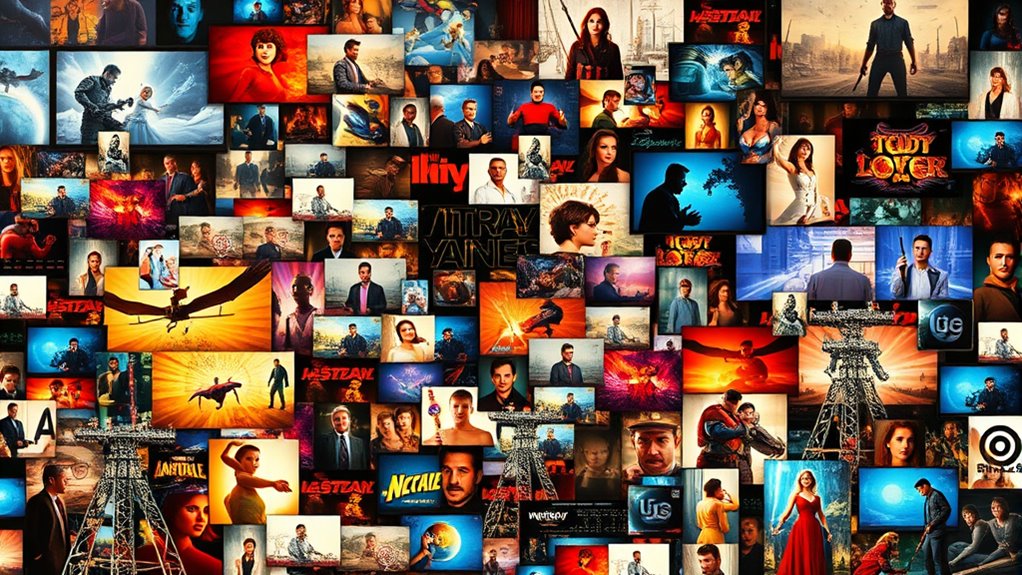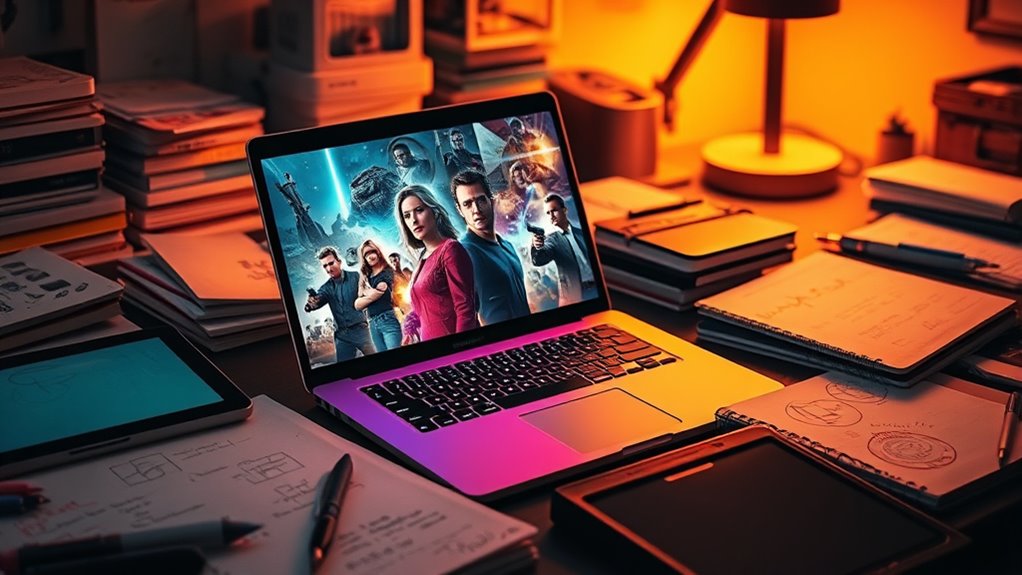As a fan, you might create edits to celebrate or reimagine your favorite media, but it’s important to understand the ethical and legal boundaries. Fan edits can sometimes infringe on copyright if they aren’t transformative or don’t add enough new meaning. Platforms may flag or remove your work, especially if monetized. Respect for original creators is key, and knowing the rules can help you stay safe. Keep exploring to learn how copyright laws influence your fan projects.
Key Takeaways
- Fan edits showcase creativity but may infringe on copyright if unauthorized, raising ethical and legal concerns.
- Fair use can protect transformative edits, but it depends on purpose, content amount, and impact on original market value.
- Platforms like YouTube use Content ID to detect and remove unauthorized fan edits, risking takedowns regardless of fair use claims.
- Monetizing fan edits increases legal risks, as companies actively monitor and can pursue legal action for unauthorized use.
- Respect for original creators’ rights is essential, and understanding copyright laws helps balance fandom enthusiasm with legal compliance.

Have you ever wondered whether creating fan edits crosses ethical or legal lines? Fan edits have become a popular way for enthusiasts to showcase their creativity and celebrate their favorite movies, TV shows, or music. They allow you to remix scenes, add your own spin, or craft entirely new stories from existing content. This surge in fan creativity has led many to ask: where do we draw the line between passionate tribute and potential legal trouble? The answer isn’t always straightforward, as copyright concerns loom large in this space. While your intentions may be purely admiration, the law often views these edits through a different lens. Copyright holders typically see their original works as protected intellectual property, and unauthorized modifications can be viewed as infringement. That doesn’t mean all fan edits are automatically illegal, but it does mean you should be aware of the risks involved.
Many fans believe their edits fall under fair use, especially if they’re transformative—meaning they add new meaning or substantially alter the original work. However, fair use isn’t a guarantee; it’s a legal defense that’s only tested in court, and its application varies case by case. Factors like whether the fan edit is for personal enjoyment or for public sharing, whether it impacts the market value of the original, and how much of the original content is used all play a role. If you’re creating fan edits for platforms like YouTube or social media, you should understand that copyright holders often have content ID systems or takedown notices to remove unauthorized content. Even if you believe your work qualifies as fair use, there’s no guarantee it won’t be taken down or flagged.
Understanding the legal boundaries around content modification can help you make informed decisions and avoid potential copyright infringement issues. Copyright concerns also extend to monetization. If you’re earning money from fan edits—whether through ads, sponsorships, or merchandise—you could face more serious legal repercussions. Many companies actively monitor for unauthorized use of their content and may pursue legal action to protect their rights. As a fan, it’s tempting to share your work widely, but it’s essential to respect the rights of the original creators. Giving credit helps, but it doesn’t necessarily shield you from legal issues. Ultimately, understanding the basics of copyright law and the boundaries of fair use can help you navigate the fine line between celebrating your fandom and infringing on intellectual property rights. Being informed allows you to enjoy your passion responsibly and ethically, without risking legal complications.
Frequently Asked Questions
Can Fan Edits Be Monetized Legally?
You wonder if you can monetize fan edits legally. Generally, fan edit licensing is tricky because it often infringes on creator rights, especially if you use copyrighted material without permission. Even if you intend to monetize, you risk legal issues unless you secure proper rights or licenses from the original creators. Without permission, monetizing fan edits usually violates copyright law, so it’s safest to seek clear licensing to avoid infringement.
How Do Fair Use Policies Apply to Fan Edits?
When considering fair use policies, you need to understand how they apply to fan edits, which often involve using copyrighted material. Fair use allows limited use of intellectual property for purposes like commentary, criticism, or parody, but it’s not guaranteed. You should evaluate factors like the purpose, amount used, and impact on the original work. Always be cautious, as unauthorized fan edits can still infringe on copyright laws.
Are There Specific Platforms That Support Fan Edits?
Fan communities act as the heart of fan edits, but not all platforms support them. You’ll find sites like YouTube and TikTok where content licensing policies are more flexible, allowing for creative freedom. However, some platforms have strict rules or copyright restrictions, making it harder to share fan edits freely. Always check each platform’s policies to make certain your work respects licensing rules and stays within fair use boundaries.
What Legal Risks Do Creators Face With Fan Edits?
When creating fan edits, you face legal risks related to intellectual property and content licensing. You might infringe on copyright if you use copyrighted materials without permission, risking takedown notices or legal action. Even if your work is transformative, it’s risky without proper licensing or fair use defense. Always understand the rights holders’ policies and seek permission when possible to avoid potential legal consequences.
How Do Copyright Laws Vary Internationally Regarding Fan Edits?
Exploring international copyright differences is like sailing through a sea of varying laws, where enforcement challenges can make it tricky. You’ll find that countries differ greatly in how they treat fan edits, with some being more lenient and others strict. These disparities can cause confusion and legal risks, as what’s allowed in one nation might land you in hot water elsewhere. Staying informed helps you avoid legal storms across borders.
Conclusion
As you explore fan edits, remember that over 70% of creators appreciate passionate fans, but ethical and copyright issues still matter. Respecting original works guarantees your creativity doesn’t cross legal lines. By understanding both the boundaries and the passion behind fan edits, you can contribute meaningfully without risking infringement. So, keep your enthusiasm alive—just do it responsibly—and you’ll be part of a vibrant, respectful fan community that celebrates shared love for the content.









